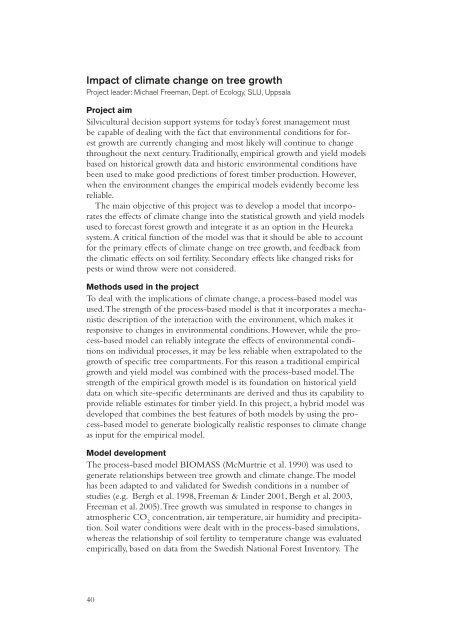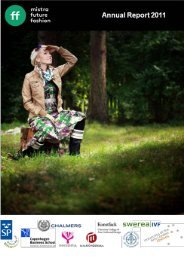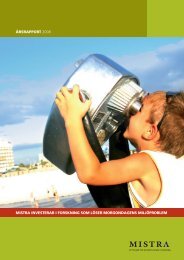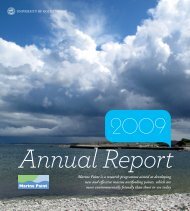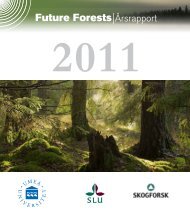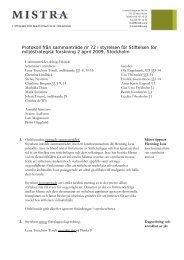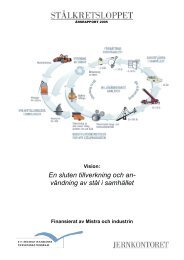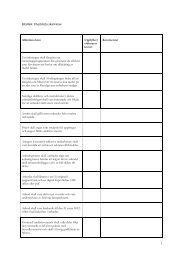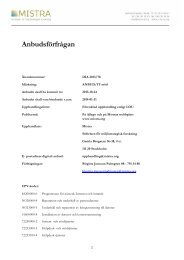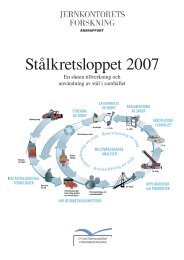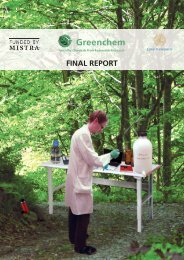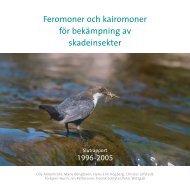The Heureka Research Programme - Mistra
The Heureka Research Programme - Mistra
The Heureka Research Programme - Mistra
Create successful ePaper yourself
Turn your PDF publications into a flip-book with our unique Google optimized e-Paper software.
Impact of climate change on tree growthProject leader: Michael Freeman, Dept. of Ecology, SLU, UppsalaProject aimSilvicultural decision support systems for today’s forest management mustbe capable of dealing with the fact that environmental conditions for forestgrowth are currently changing and most likely will continue to changethroughout the next century. Traditionally, empirical growth and yield modelsbased on historical growth data and historic environmental conditions havebeen used to make good predictions of forest timber production. However,when the environment changes the empirical models evidently become lessreliable.<strong>The</strong> main objective of this project was to develop a model that incorporatesthe effects of climate change into the statistical growth and yield modelsused to forecast forest growth and integrate it as an option in the <strong>Heureka</strong>system. A critical function of the model was that it should be able to accountfor the primary effects of climate change on tree growth, and feedback fromthe climatic effects on soil fertility. Secondary effects like changed risks forpests or wind throw were not considered.Methods used in the projectTo deal with the implications of climate change, a process-based model wasused. <strong>The</strong> strength of the process-based model is that it incorporates a mechanisticdescription of the interaction with the environment, which makes itresponsive to changes in environmental conditions. However, while the process-basedmodel can reliably integrate the effects of environmental conditionson individual processes, it may be less reliable when extrapolated to thegrowth of specific tree compartments. For this reason a traditional empiricalgrowth and yield model was combined with the process-based model. <strong>The</strong>strength of the empirical growth model is its foundation on historical yielddata on which site-specific determinants are derived and thus its capability toprovide reliable estimates for timber yield. In this project, a hybrid model wasdeveloped that combines the best features of both models by using the process-basedmodel to generate biologically realistic responses to climate changeas input for the empirical model.Model development<strong>The</strong> process-based model BIOMASS (McMurtrie et al. 1990) was used togenerate relationships between tree growth and climate change. <strong>The</strong> modelhas been adapted to and validated for Swedish conditions in a number ofstudies (e.g. Bergh et al. 1998, Freeman & Linder 2001, Bergh et al. 2003,Freeman et al. 2005). Tree growth was simulated in response to changes inatmospheric CO 2concentration, air temperature, air humidity and precipitation.Soil water conditions were dealt with in the process-based simulations,whereas the relationship of soil fertility to temperature change was evaluatedempirically, based on data from the Swedish National Forest Inventory. <strong>The</strong>40


